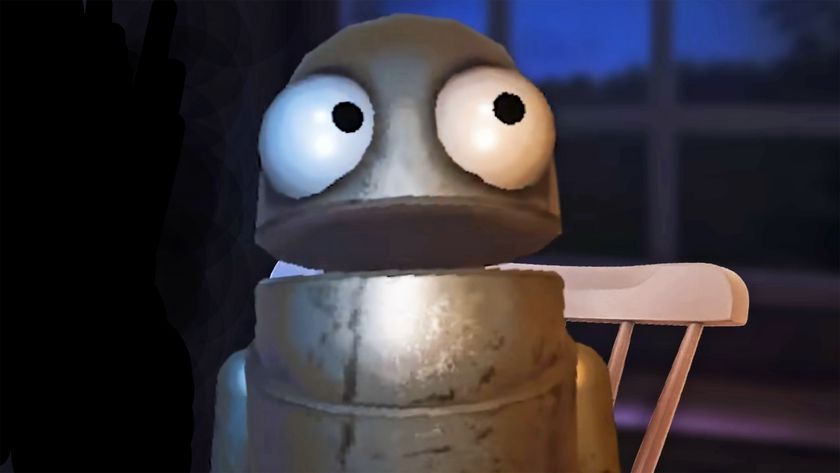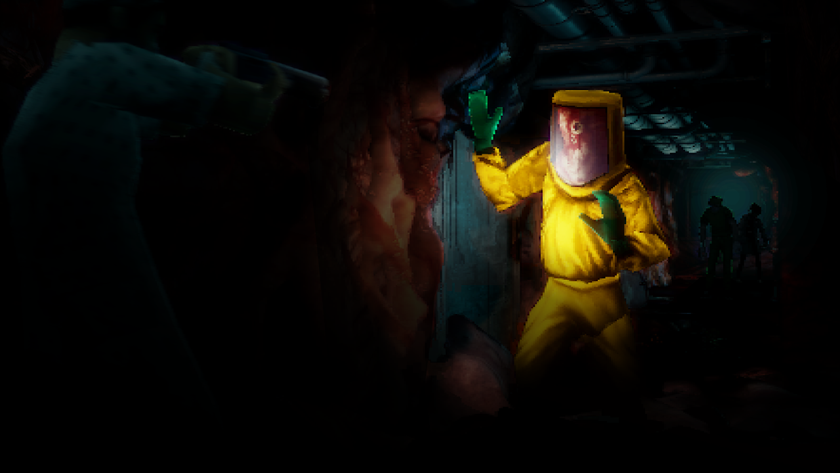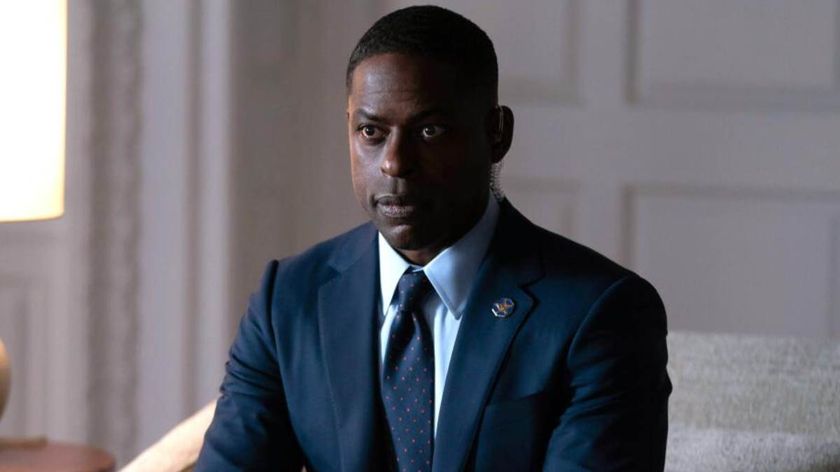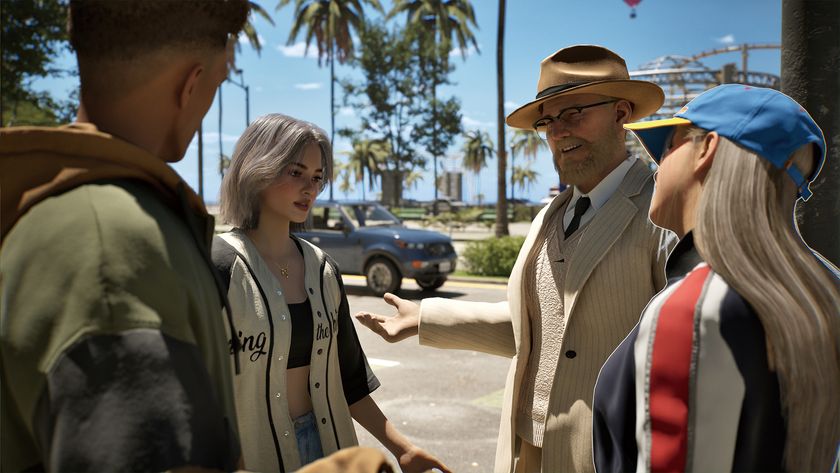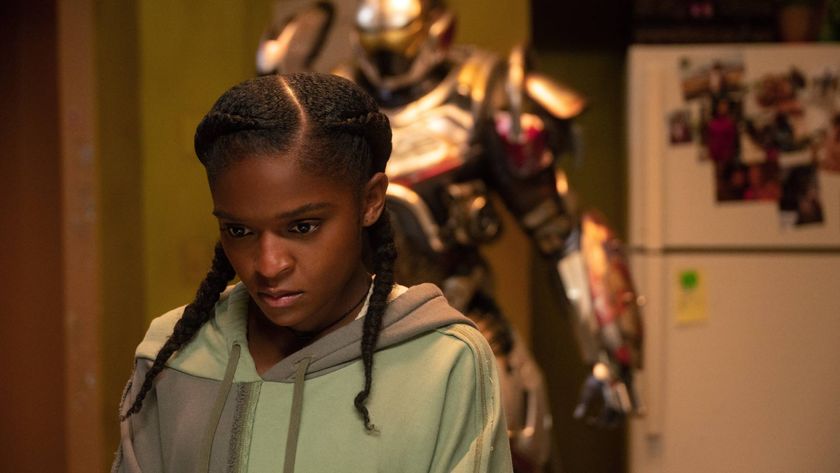Here's how "the best Friday the 13th film" inspired a scrapped Dead Island 2 mechanic in a game that's re-flipping the script on zombie fiction
Interview | "We're gonna be an 18 game, let's f*cking earn it"
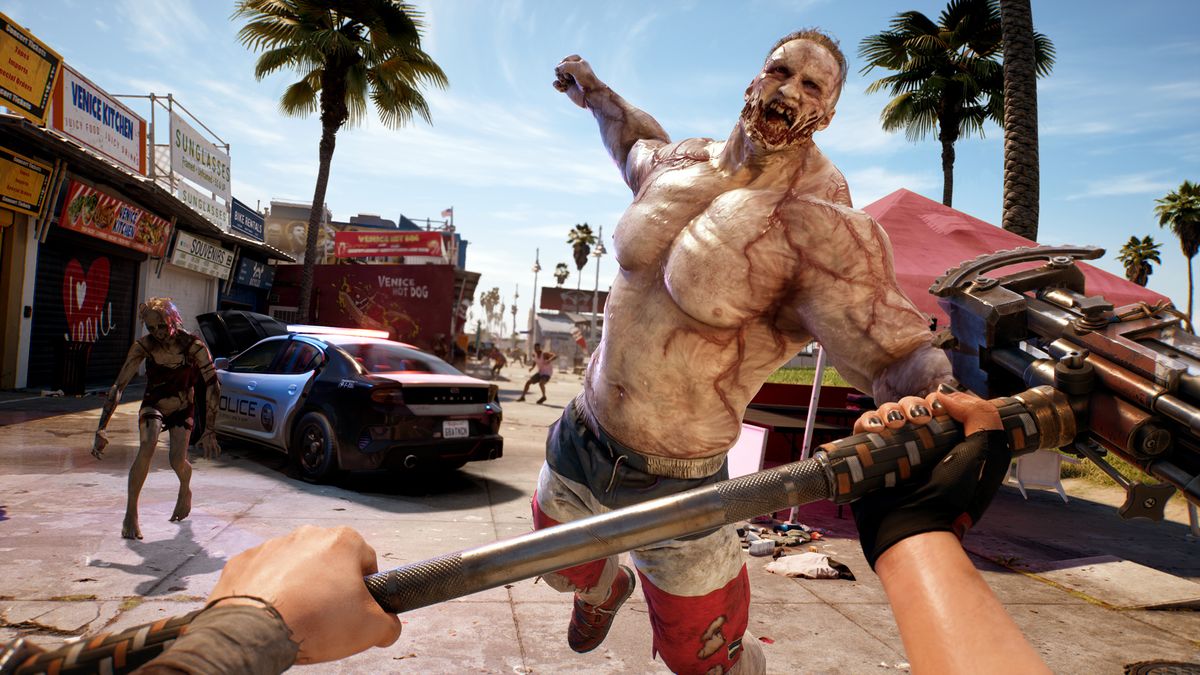
My conversation with Dan Evans-Lawes, tech art director for Dead Island 2 over at Dambuster Studios, almost gets off on the wrong sawn-off foot. "We did, at one point, have the idea of being able to freeze zombies – so you can get zombies wet and then [do a] liquid nitrogen type thing. I don't know if you've seen the best Friday the 13th film, Jason X?"
I hold myself back from arguing the case for Freddy vs Jason and let him finish. "In Jason X, there's that amazing scene where he freezes that woman's head and smashes it, and also, a similar scene at the end of Demolition Man. We were definitely like, 'well, that could be cool,' but that didn't make it into [the game]."
Gnarly, garish, and deliriously macabre, this scrapped Dead Island 2 freeze mechanic perfectly reflects the game's artistic roots in the near-comedic gore of 80s horror. Namely, the practical effects involved in pulling them off. It's a fascination that has long inspired Evans, both as a horror fan and a game developer, and partly fuels Dead Island 2's mission statement: to bring old-school zombies back into focus.
Heads will roll
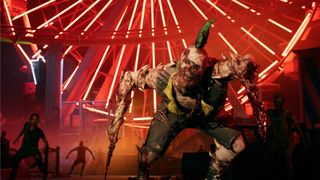
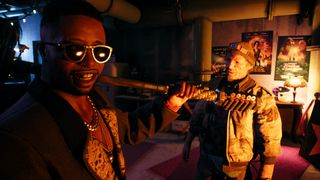
Dead Island 2 review: "A one note thrill, but it's a note that absolutely sings"
"I remember watching Return of the Living Dead…and just absolutely loving it," Evans says of his emergent, 14-year-old self's initial interest in horror movie violence. "I'd never seen anything like it before in my life. I loved the sort of attitude of it, that blend of being funny but also genuinely quite horrific."
He also points to memorable non-zombie movies, too. "Robocop was another one that I watched at an early age [featuring] extreme practical effects. The melting man was a big influence on trying to get all the melting effects working well in Dead Island 2, because I'd never seen anyone properly melting people in a video game before."
As the technical art director for one of the goriest and best zombie games of recent years, Evans knows better than anyone that the devil really is in the detail – especially when it comes to Dead Island 2's commitment to anatomical precision. "One of the things that I did was material effects," explains Evans. "When you cut into a zombie, there's a technique for modeling the various layers of skin, fat, and then muscle at the bottom, and then you go through to the skeleton, and all the internal organs. That sort of gradient through the flesh is something that I did in the materials, and so in order to get that gradient right, I looked at some surgery pictures because there you've got a very good cross section of a person." Surgical images proved a more ethical alternative to staring at real-life gore, but a key inspiration? "Practical effects from films, obviously."
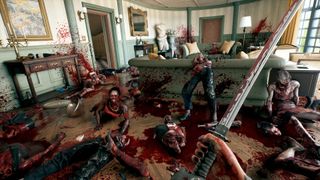
The decision to make Dead Island 2 a thoroughly gory affair was a major one, both for Dambuster and for the artistic direction of the game as a long-awaited sequel. To Evans, the gore became the main draw of the project. "When we first got the project at Dambuster, being completely honest, my first reaction was 'Ugh, it's a zombie game.' Like, there's a lot of zombie games, you know what I mean? I'd absolutely loved zombie films when I was a teenager…but more recently, I'd kind of gone off them because I thought it had become oversaturated."
Sign up to the 12DOVE Newsletter
Weekly digests, tales from the communities you love, and more
Evans isn't wrong in that. Zombies are rife in the mainstream in 2024, with almost every reanimated corpse now shambling in the shadows cast by huge names across film, TV, and video game landscapes alike. From The Walking Dead to The Last of Us, Evans notes how the "tone of zombie fiction at that point in time" was more concerned with deep themes rather than deep wounds. "[The zombie genre] takes itself pretty seriously. It's about human tragedies and things that occur in the outbreak, and [for Dead Island 2] I was like, 'No, it's overdone. The market's saturated.' So my initial thought was like, 'Well, in order to make this interesting, we have to take it back to the splatter-style zombies,' you know, the 18 rating. We're gonna be an 18 game – let's f*cking earn it."
Once more, with bleeding
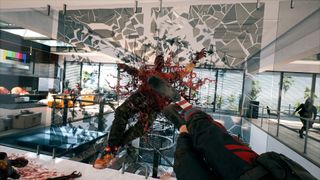
You make the act of killing zombies fun just in and of itself, without any of the rest of the game's trappings around them.
Dan Evans-Lawes, Dambuster Studios
As much as all the video game gore entrances me, it's impossible to ignore the context of Dead Island 2 as the continuation of an existing franchise – and potentially, a reboot if it.
While rendering the technical art for the game, says Evans, "there was a lot of discussion within the studio about where we were gonna land tonally." After all, there was a legacy attached to the Dead Island name by the time Dambuster was handed the reins, even with Dead Island 1 developer Techland having moved on with spiritual successor Dying Light by that point.
Despite being another first-person zombie game, "Dying Light went off in one direction, which was very much around parkour and that side of things," says Evans. "So we didn't want to do the same thing. That was definitely a conscious decision, to not go in that direction and focus instead on the up-close-and-personal stuff." Then, it became a matter of taking the tech work and presenting it to the publisher as an example of what Dambuster's Dead Island 2 could be.
Playing off the ragdoll physics as seen in the first game, Dead Island 2 goes all-in on the momentum and physicality of zombie-slaying. "Something that I really like in games is when you interact with something and it reacts in a way that you expect it to," Evans says. "This is where we put lots of effort into the guts being floppy, and the eyeballs and jaws dangling off, because all that gives you that extra sense of impact. Everything feels like it is reacting in a way that feels believable, but exaggerated. I think that idea of just being able to play with the zombie was a big thing that I thought was important, because you make the act of killing zombies fun just in and of itself, without any of the rest of the game's trappings around them."
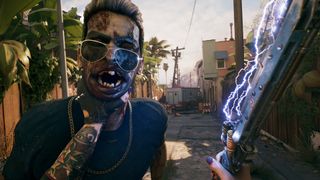
I really don't like it when they remake classic movies…but with games, it feels a little different.
Dan Evans-Lawes, Dambuster Studios
Did things ever get too real for the Dambuster art team, or for playtesters in the game's earlier stages? Well, sort of.
"I think we did have one employee leave because it was too violent," Evans laughs. "Only one. In general though, in terms of how it was different to Dead Island 1, I kind of feel like that DI1 had that [same] knock-about fun kind of vibe to it. Generally, people felt that DI2 kept the same kind of feel, but just made it a bit more modern mechanically and a little bit more fluid. I don't remember anybody being like, 'Oh, this is like nothing like Dead Island, what are you doing?' People felt like it was a good progression."
This feeling of progression is perhaps what sets Dead Island 2 apart. It's less a remake and more of a chance to reboot the series under a new developer, saving it from the scrutiny usually applied to remakes and reboots of popular horror games once a passionate audience gets the chance to pull them to pieces. The culprit is almost always a deep love for the original, whether that be a beloved movie or video game – but what makes the genre so magnetic, enough to trigger the remake renaissance we're experiencing right now?
"It's an interesting one with games, isn't it?" We spend a few moments lamenting all the crimes against The Texas Chain Saw Massacre committed by its remakes before Evans states what most horror fans are thinking. "When it comes to movies, I am very anti-remake. Like, I really don't like it when they remake classic movies…but with games, it feels a little different."
One reason for this difference is hinted at in Evans' own job title. "Technology moves on quite a lot [over time], and I think technology is more heavily integrated into a game than a film. I feel like sometimes there are games where [you know] it's a great game, but the fact that it was made at the time it was made holds it back a little bit – which is, I think, much less true for film. So I think that there are arguments for remaking games. I'd always prefer a sequel, though," Evans muses. "Just make something that's a bit different."
From Silent Hill 2 to Slitterhead, here are all the upcoming horror games to watch for in 2024 and beyond.

Jasmine is a staff writer at 12DOVE. Raised in Hong Kong and having graduated with an English Literature degree from Queen Mary, University of London in 2017, her passion for entertainment writing has taken her from reviewing underground concerts to blogging about the intersection between horror movies and browser games. Having made the career jump from TV broadcast operations to video games journalism during the pandemic, she cut her teeth as a freelance writer with TheGamer, Gamezo, and Tech Radar Gaming before accepting a full-time role here at GamesRadar. Whether Jasmine is researching the latest in gaming litigation for a news piece, writing how-to guides for The Sims 4, or extolling the necessity of a Resident Evil: CODE Veronica remake, you'll probably find her listening to metalcore at the same time.
